Related Research Articles
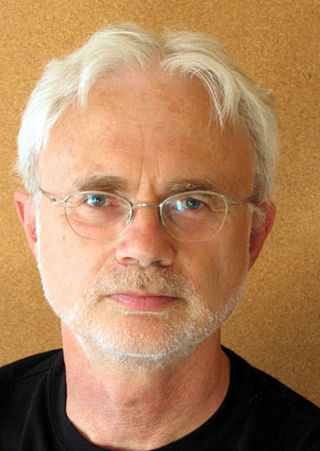
John Coolidge Adams is an American composer and conductor. Among the most regularly performed composers of contemporary classical music, he is particularly noted for his operas, many of which center around historical events. Apart from opera, his oeuvre includes orchestral, concertante, vocal, choral, chamber, electroacoustic, and piano music.
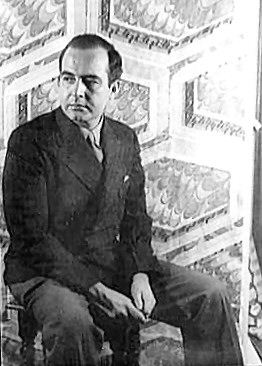
Samuel Osmond Barber II was an American composer, pianist, conductor, baritone, and music educator, and one of the most celebrated composers of the mid-20th century. Principally influenced by nine years' composition studies with Rosario Scalero at the Curtis Institute and more than 25 years' study with his uncle, the composer Sidney Homer, Barber's music usually eschewed the experimental trends of musical modernism in favor of traditional 19th-century harmonic language and formal structure embracing lyricism and emotional expression. However, he adopted elements of modernism after 1940 in some of his compositions, such as an increased use of dissonance and chromaticism in the Cello Concerto (1945) and Medea's Dance of Vengeance (1955); and the use of tonal ambiguity and a narrow use of serialism in his Piano Sonata (1949), Prayers of Kierkegaard (1954), and Nocturne (1959).

The Pulitzer Prize for Music is one of seven Pulitzer Prizes awarded annually in Letters, Drama, and Music. It was first given in 1943. Joseph Pulitzer arranged for a music scholarship to be awarded each year, and this was eventually converted into a prize: "For a distinguished musical composition of significant dimension by an American that has had its first performance in the United States during the year."
Shulamit Ran is an Israeli-American composer. She moved from Israel to New York City at 14, as a scholarship student at the Mannes College of Music. Her Symphony (1990) won her the Pulitzer Prize for Music. She was the second woman to win the Pulitzer Prize for Music, the first being Ellen Taaffe Zwilich in 1983. Ran was a professor of music composition at the University of Chicago from 1973 to 2015. She has performed as a pianist in Israel, Europe and the U.S., and her compositional works have been performed worldwide by a wide array of orchestras and chamber groups.
John Paul Corigliano Jr. is an American composer of contemporary classical music. With over 100 compositions, he has won accolades including a Pulitzer Prize, five Grammy Awards, Grawemeyer Award for Music Composition, and an Academy Award.
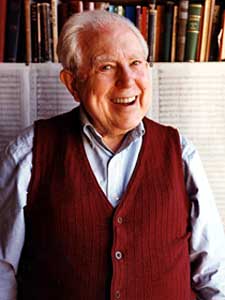
Elliott Cook Carter Jr. was an American modernist composer. One of the most respected composers of the second half of the 20th century, he combined elements of European modernism and American "ultra-modernism" into a distinctive style with a personal harmonic and rhythmic language, after an early neoclassical phase. His compositions are performed throughout the world, and include orchestral, chamber music, solo instrumental, and vocal works. The recipient of many awards, Carter was twice awarded the Pulitzer Prize for his string quartets; he also wrote the large-scale orchestral triptych Symphonia: sum fluxae pretium spei.

Walter Hamor Piston, Jr., was an American composer of classical music, music theorist, and professor of music at Harvard University.
Aaron Jay Kernis is a Pulitzer Prize- and Grammy Award-winning American composer serving as a member of the Yale School of Music faculty. Kernis spent 15 years as the music advisor to the Minnesota Orchestra and as director of the Minnesota Orchestra's Composers' Institute, and is currently the workshop director of the Nashville Symphony Composer Lab. He has received numerous awards and honors throughout his thirty-five-year career. He lives in New York City with his wife, pianist Evelyne Luest, and their two children.
David Walter Del Tredici was an American composer. He won a Pulitzer Prize for Music and was a Guggenheim and Woodrow Wilson fellow. Del Tredici is considered a pioneer of the Neo-Romantic movement. He was also described by the Los Angeles Times as "one of our most flamboyant outsider composers".
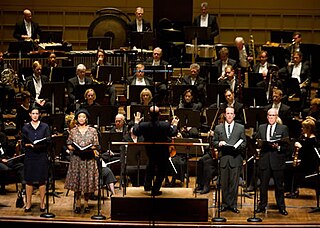
Steven Edward Stucky was a Pulitzer Prize-winning American composer.

Jennifer Elaine Higdon is an American composer of contemporary classical music. She has received many awards, including the 2010 Pulitzer Prize for Music for her Violin Concerto and three Grammy Awards for Best Contemporary Classical Composition for her Percussion Concerto in 2010, Viola Concerto in 2018, and Harp Concerto in 2020. Elected a Member of the American Philosophical Society in 2019, she was a professor of composition at the Curtis Institute of Music from 1994 to 2021.
Joseph Clyde Schwantner is a Pulitzer Prize-winning American composer, educator and a member of the American Academy of Arts and Letters since 2002. He was awarded the 1970 Charles Ives Prize.
Yehudi Wyner is an American composer, pianist, conductor and music educator.
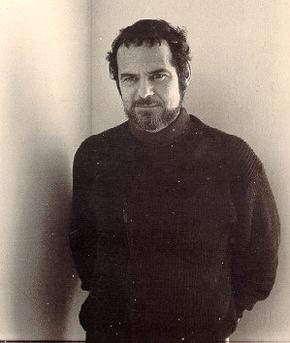
Stephen Joel Albert was an American composer. He is best known for his Pulitzer Prize winning Symphony No. 1 RiverRun (1983) and his Cello Concerto (1990), written for Yo-Yo Ma. He died suddenly in a 1992 automobile accident, having just sketched out his Second Symphony. The work was subsequently completed by Sebastian Currier, and his death sparked musical tributes from composer colleagues such as Aaron Jay Kernis and Christopher Rouse.
Wayne Peterson was an American composer, pianist, and educator. He won the Pulitzer Prize for Music for The Face of the Night, the Heart of the Dark in 1992, when its board overturned the jury's unanimous selection of Concerto Fantastique by Ralph Shapey.
The Second Concerto for Orchestra is a concerto for orchestra by the American composer Steven Stucky. The work was commissioned by the Los Angeles Philharmonic while Stucky was their composer-in-residence for the inaugural season of the Walt Disney Concert Hall. It was completed in 2003 and was first performed on March 12, 2004, with the conductor Esa-Pekka Salonen leading the Los Angeles Philharmonic. The piece was awarded the 2005 Pulitzer Prize for Music.
Concerto Fantastique is an orchestral composition in four movements by the American composer Ralph Shapey. The work was commissioned by the Chicago Symphony Orchestra, who first performed the work under the composer on November 21, 1991. It was a finalist for the 1992 Pulitzer Prize for Music.
The Violin Concerto is a composition for solo violin and orchestra by the American composer Joan Tower. It was commissioned by the Barlow Endowment for Music Composition and the Snowbird Institute. The piece was first performed by the violinist Elmar Oliveira and the Utah Symphony under the conductor Joseph Silverstein on April 24, 1992, in Salt Lake City, Utah. It is dedicated to the violinist Elmar Oliveira. The composition was a finalist for the 1993 Pulitzer Prize for Music.
The Symphonia: sum fluxae pretium spei is an orchestral triptych by the American composer Elliott Carter. Its three movements were composed between 1993 and 1995. The complete work was first performed on April 25, 1998 at Bridgewater Hall, Manchester by the BBC Symphony Orchestra under the conductor Oliver Knussen. The second movement "Adagio tenebroso" was a finalist for the 1996 Pulitzer Prize for Music. The third movement "Allegro scorrevole" won The Prince Pierre of Monaco Music Composition Prize in 1998.
The Piano Concerto No. 1 is a composition for solo piano and orchestra by the American composer Peter Lieberson. The work was commissioned by the Boston Symphony Orchestra for its centennial. Lieberson started composing the piece in 1980 and completed it on March 2, 1983. It was written for the pianist Peter Serkin, who first performed the concerto with the Boston Symphony Orchestra under the direction of Seiji Ozawa on April 21, 1983. The piece is dedicated to Peter Serkin and Seiji Ozawa. It was a finalist for the 1984 Pulitzer Prize for Music.
References
- ↑ "Yehudi Wyner's Pulitzer Prize-Winning Concerto". NPR. April 18, 2006. Retrieved September 24, 2015.
- ↑ Eichler, Jeremy (June 21, 2009). "A musical mensch-in-residence, with 'keys in hand'". The Boston Globe . Retrieved September 24, 2015.
- 1 2 Wyner, Yehudi. Piano Concerto "Chiavi in Mano" (2004). G. Schirmer Inc. Retrieved September 24, 2015.